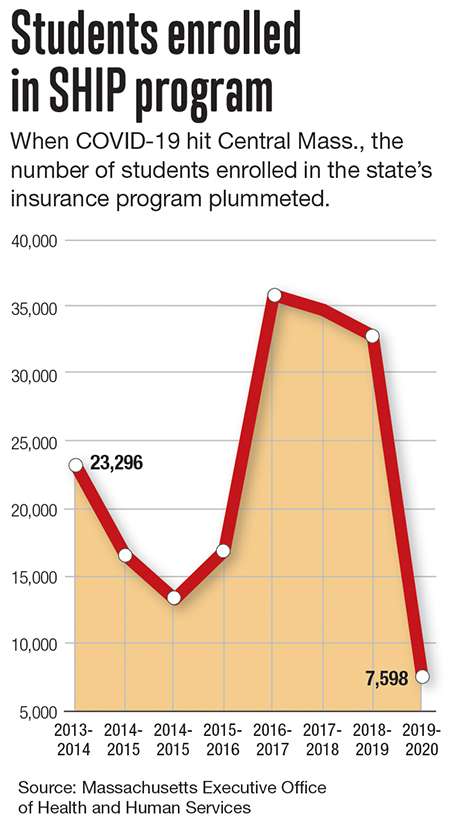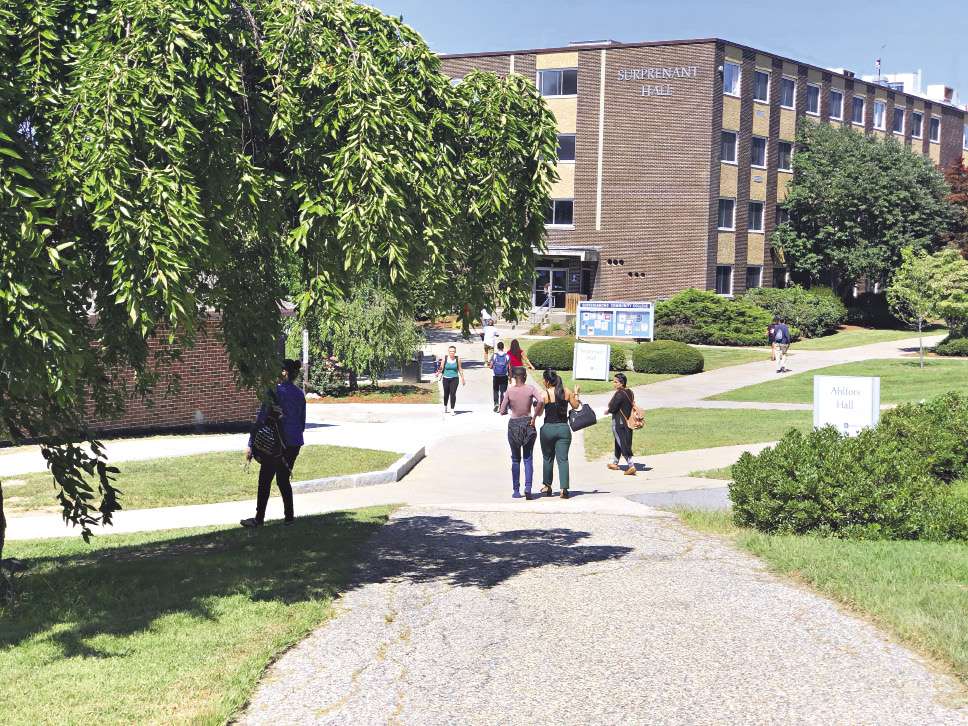
As premiums spike, Mass. is eliminating the more confusing aspects of its student health insurance program
 PHOTOS/COURTESY OF QUINSIGAMOND COMMUNITY COLLEGE
Quinsigamond Community College has 153 students enrolled in SHIP.
PHOTOS/COURTESY OF QUINSIGAMOND COMMUNITY COLLEGE
Quinsigamond Community College has 153 students enrolled in SHIP.
The world of health insurance is oftentimes difficult to navigate. Co-pays, in-network doctors, out-of-network procedures, and premiums can be hard to figure out, especially if you are a young college student unfamiliar with healthcare coverage.
The Student Health Insurance Plan (SHIP) has provided health insurance to Massachusetts students for decades, while its more recent Student Health Insurance Plan Premium Assistance (SHIP PA) program helped control premium costs. However, declining student participants and rising premium costs led to the elimination of SHIP PA. While this change succeeded in reducing the confusion associated with student health insurance, it highlighted the misinformation long surrounding this state program.
“It is complicated. These poor students would just be confused,” said Beth Auger, Quinsigamond Community College director of financial compliance, about trying to figure out insurance coverage prior to the state’s decision to eliminate the SHIP PA portion of the SHIP program.

SHIP and SHIP PA
Since 1989, Massachusetts has required every student enrolled in higher education to be covered by health insurance. This state law mandates every higher education institution – public and private – must offer their full-time and part-time students access to their college’s version of SHIP or accept an insurance meeting state insurance standards.
This program allows students who can obtain insurance through their parents or their work to retain their current insurance while offering students who cannot afford insurance, the ability to receive access to health care.
During the 2016-2017 school year, MassHealth introduced the SHIP PA program to allow MassHealth-eligible students the ability to still receive their MassHealth benefits while also enrolling in SHIP for additional coverage. The purpose of the PA program was to cover the premium and out-of-pocket insurance costs for full-time students, making the insurance plan cost the same as an equivalent MassHealth plan.
All public colleges and universities use Blue Cross Blue Shield of Massachusetts as their main insurer, while private colleges are able to select other insurance companies meeting state standards. As a result, students taking part in the PA program would end up with two different insurance plans: their student health insurance (BCBS or another insurer through a private college) as their primary and MassHealth as their secondary.
What began as a way to control premium costs while providing quality health insurance benefits to students resulted in confusion for both students and schools who had to navigate two different, yet equally confusing plans.
Student use of SHIP declines
During the 2019-2020 school year, 32,912 students partook in SHIP, according to data released by MassHealth. However, the number of students utilizing SHIP has decreased since the Affordable HealthCare Act of 2010 and was further diminished by the coronavirus pandemic, where students forgoing in-person coursework could waive their SHIP plan coverage.
These factors resulted in the number of students in SHIP from 2020-2021 dropping to 7,598.
SHIP PA elimination
In February 2020, MassHealth announced it would eliminate the SHIP PA Program, citing skyrocketing premium increases by BCBS.
According to figures provided by the Massachusetts Executive Office of Health & Human Services, BCBS estimated an average premium increase of 47% for all students attending public colleges/universities if MassHealth members remained in the SHIP PA Program. This would have also resulted in an approximate 50% premium increase for non-MassHealth students who had their insurance through SHIP.
As a result, while SHIP as a whole remains intact, SHIP PA is in the process of being phased out by the end of the 2020-2021 academic year.
“This decision prevented all students receiving health care coverage through the Student Health Insurance Program from experiencing exorbitant premium increases and allowed for continuous coverage for students who receive MassHealth for the upcoming school year,” EOHHS said in a written statement.
BCBS is still the sole provider of health insurance for all the SHIP programs available at public colleges and universities; however, it no longer heads the PA program as it is phased out.
In a written statement, BCBS said it will continue to be involved with SHIP as a whole.
“At Blue Cross Blue Shield of Massachusetts, we’re proud to offer student health coverage that provides a vast array of benefits and a broad provider network to students enrolled in Massachusetts colleges and universities,” BCBS said in the written statement.

SHIP PA in the classroom
After years of working with SHIP, Auger is glad to see the PA portion of the program eliminated. She described scenarios in which MassHealth-eligible students would enroll for QCC’s SHIP program only to find out that they had automatically been enrolled in the BCBS coverage as well. Due to the state’s mandate, the BCBS would become the students’ primary insurance, meaning that students would not be able to see their previous MassHealth doctors if they were outside the BCBS network.
The responsibility to help students navigate their health insurance often fell on the administration, who tried to help the students, but who were also confused by what the different insurances covered and what they didn’t.
“We were not able to fully assist the students with their often-complex issues,” Auger said.
The program was equally frustrating for both college staff and students, she said.
Auger said by automatically transferring students’ coverages, the PA program undermined the ability of students to make decisions as consumers.
The feedback QCC received from students on the PA program was students did not understand why they were transferred off of MassHealth while their doctors could not figure out which insurance to bill.
Thanks to the elimination of the program, students on MassHealth can keep their current doctors and not have to go through the long reimbursement process for copays.
As with the state figures, QCC has seen a rapid drop in students needing SHIP assistance. However, Auger sees this decline as good news indicative of students getting their health insurance needs met elsewhere and not relying on this system.
During the fall 2020 and spring 2021 semesters, QCC has 4,163 students enrolled, of which only 153 students are participating in the school’s SHIP program. While the program is not in high demand, Auger said it is an essential service for students who would not otherwise have access to healthcare.
Misinformation and confusion are key hurdles the program has faced, especially since the changes were announced during the pandemic and students may not be aware of them as they enter the fall semester. This difficulty is only added between the similar names, but different policies, of SHIP and SHIP PA. Auger said getting more information about student health insurance out in the open will help students better understand their current coverage options.
“There is a lot of information out there, and it is still hard to find answers. Anyway we can educate students about this is great,” she said.













0 Comments